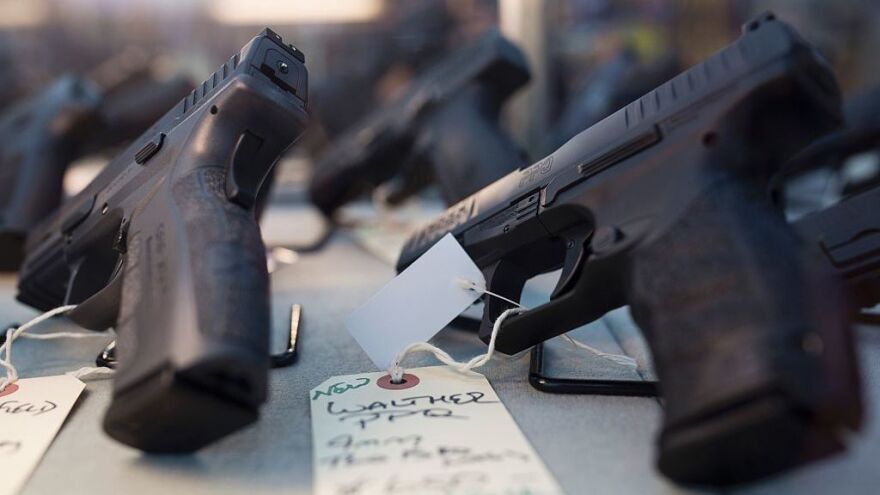The Department of Justice on Monday issued model legislation from which states can craft their own "extreme risk protection orders," commonly referred to as red flag laws, as part of the Biden administration's ongoing effort to curb U.S. gun violence.
"The Justice Department is determined to take concrete steps to reduce the tragic toll of gun violence in our communities," Attorney General Merrick Garland said in a statement.
"Today we continue to deliver on our promise to help save lives while protecting the rights of law-abiding Americans. We welcome the opportunity to work with communities in the weeks and months ahead in our shared commitment to end gun violence."
These protection orders, or ERPOs, are laws designed to temporarily remove guns from people deemed dangerous by — depending on the state — family members, police and/or medical professionals.
The model put forward by the Justice Department on Monday combines two distinct approaches adopted by states where red flag laws already exist.
The first approach is described by the agency as a "warrant" statute, which gives law enforcement an immediate vehicle with which they can seek to seize a person's guns once a court has determined that the individual presents a danger to themselves or others. This mode of seizure does not, however, bar that person's future possession or acquisition of firearms.
The second approach described by the agency is the "order" statute, which provides for longer-term prohibition of a person's access to firearms. The challenge with this approach, as described by the Justice Department, is that law enforcement may initially need to present the order to the person on the receiving end of the confiscation process. If the person's guns are not in plain sight and the person does not immediately comply with officers' requests for confiscation, law enforcement may have to seek a search warrant, which could potentially give the individual time to hide weapons or carry out any dangerous intents.
The Justice Department's model combines the two approaches and would authorize the courts to more quickly issue a prohibition on a person's right to possess firearms. It also allows for law enforcement to be awarded a confiscation order in conjunction with a search warrant, so they could immediately seize guns at the time they present the confiscation order.
"ERPO laws are likely to be more effective when their implementation is adequately funded and supported by a broad array of affected stakeholders," the Justice Department said in a statement.
DOJ identified law enforcement, health care providers, community leaders and victim advocates as key voices in shaping legislation and informing their communities about the effort. It also said law enforcement needs training on these laws, "including on issues, for example, like filing a petition and executing an ERPO, implicit bias, de-escalation techniques, and crisis intervention."
The department said it was not endorsing any specific implementation of an ERPO law, but the Monday guidelines were instead meant to provide a framework from which states can shape their own statutes for gun removals.
Proponents of the orders argue that they enable a person's loved ones to reach out to law enforcement and report dangerous behavior before a gun owner is able to endanger themselves or others.
Critics of the laws, however, say that the rules are too arbitrary and can be weaponized against gun owners during personal disputes. Also at issue are instances of police approaching a person who is known to be armed and is perceived to be dangerous.
Such was the case of Maryland man Gary Willis, who at 61 years old was shot and killed by police in 2018 during an attempt to remove the guns from his home under the state's then-new protective order.
"By allowing family members or law enforcement to intervene and to petition for these orders before warning signs turn into tragedy, 'extreme risk protection orders' can save lives," the department said in its statement.
"They are also an evidence-based approach to the problem. The model legislation, developed after consultation with a broad range of stakeholders, provides a framework that will help more states enact these sensible laws."
Also included in the Monday announcement was a proposal that would strengthen restrictions on individuals' ability to convert pistols into "short-barreled rifles," which the agency described as "dangerous and easily concealable weapons."
The two proposals are part of President Biden's effort to roll back the trend of U.S. gun violence, which in the early days of the president's administration, resulted in several mass shootings, including an incident that advocates argued was indicative of growing anti-Asian sentiment during the coronavirus pandemic.
In April, Biden unveiled a series of executive actions, aimed at what he called the nation's "international embarrassment" of gun violence.
The actions included an effort to rein in "ghost guns" — assembled weapons that have no serial numbers and can at times evade exposure from modern metal detectors.
Copyright 2021 NPR. To see more, visit https://www.npr.org.







